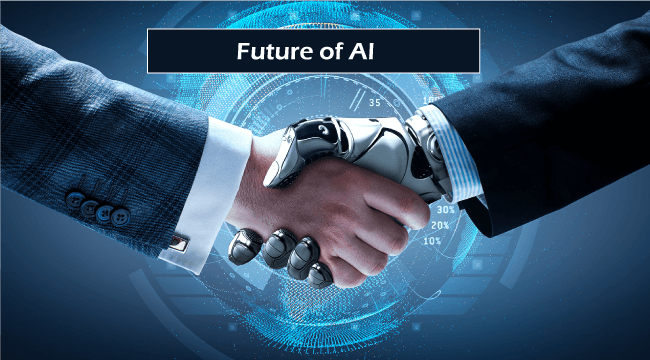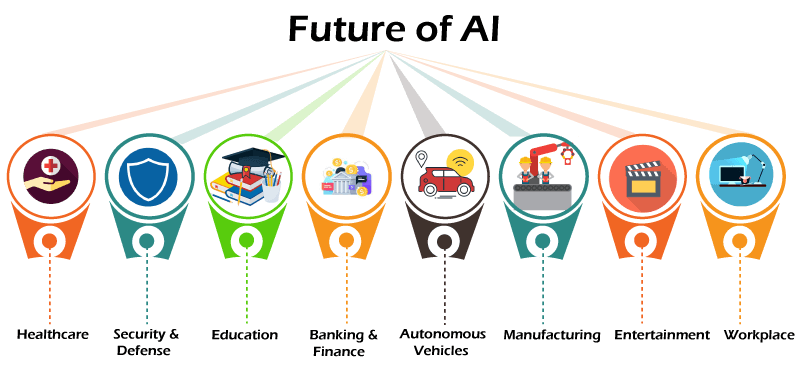Future of Artificial IntelligenceUndoubtedly, Artificial Intelligence (AI) is a revolutionary field of computer science, which is ready to become the main component of various emerging technologies like big data, robotics, and IoT. It will continue to act as a technological innovator in the coming years. In just a few years, AI has become a reality from fantasy. Machines that help humans with intelligence are not just in sci-fi movies but also in the real world. At this time, we live in a world of Artificial Intelligence that was just a story though for some years. 
We are using AI technology in our daily lives either unknowingly or knowingly, and somewhere it has become a part of our life. Ranging from Alexa/Siri to Chatbots, everyone is carrying AI in their daily routine. The development and evolution of this technology are happening at a rapid pace. However, it was not as smooth and easy as it seemed to us. It has taken several years and lots of hard work & contributions of various people to take AI at this stage. Being so revolutionary technology, AI also deals with many controversies about its future and impact on Human beings. It may be dangerous, but also a great opportunity. AI will be deployed to enhance both defensive and offensive cyber operations. Additionally, new means of cyber-attack will be invented to take advantage of particular vulnerabilities of AI technology. This topic will discuss the future of AI and its impact on human life, i.e., whether it is a great technology or a threat to humans. Artificial Intelligence (AI) at PresentBefore going deep dive into AI in future, first, let's understand what is Artificial Intelligence and at what stage it is at present. We can define AI as, "It is the ability of machines or computer-controlled robot to perform task that are associated with intelligence." So, AI is computer science, which aims to develop intelligent machines that can mimic human behaviour. Based on capabilities, AI can be divided into three types that are:
At the current stage, AI is known as Narrow AI or Weak AI, which can only perform dedicated tasks. For example, self-driving cars, speech recognition, etc. Myths about Advanced Artificial Intelligence1. Superintelligence by the year 2100 is not possible.The reality about the possibility of superintelligence is that currently, we can't determine it. It may occur in decades, or centuries, or may never, but nothing is confirmed. There have been several surveys in which AI researchers have been asked how many years from now they think we will have human-scale AI with at least a 50% chance. All of these surveys have the same conclusion: The world's leading experts disagree, so we don't know. For example, in such a survey of AI researchers at the 2015 Puerto Rico AI conference, the (average) answer was by 2045, but some researchers estimated hundreds of years or more. 2. I will replace all human jobs.It's certainly true that the advent of AI and automation has the potential to disrupt labour seriously - and in many situations, it is already doing just that. However, seeing this as a straightforward transfer of labour from humans to machines is a vast oversimplification. With the development of AI, a revolution has come in industries of every sector, and people fear losing jobs with the increased development of AI. But in reality, AI has come up with more jobs and opportunities for people in every sector. Every machine needs a human being to operate it. However, AI has taken over some roles, but it reverts to producing more jobs for people. 3. Super-intelligent computers will become better than humans at doing anything we can doAs discussed above, AI can be divided into three types, Weak AI, which can perform specific tasks, such as weather Prediction. General AI; Capable of performing the task as a human can do, Super AI; AI capable of performing any task better than human. At present, we are using weak AI that performs a particular task and improves its performance. On the other hand, general AI and Super AI are not yet developed, and researches are going on. They will be capable of doing different tasks similar to human intelligence. However, the development of such AI is far away, and it will take years or centuries to create such AI applications. Moreover, the efficiency of such AI, whether it will be better than humans, is not predictable at the current stage. 4. AI does not require human intervention.People also have a misconception that AI does not need any human intervention. But the fact is that AI is not yet developed to take their own decisions. A machine learning engineer/specialist is required to pre-process the data, prepare the models, prepare a training dataset, identify the bias and variance and eliminate them, etc. Each AI model is still dependent on humans. However, once the model is prepared, it improves its performance on its own from the experiences. How can Artificial Intelligence be risky?Most of the researchers agree that super AI cannot show human emotions such as Love, hate or kindness. Moreover, we should not expect an AI to become intentionally generous or spiteful. Further, if we talk about AI to be risky, there can be mainly two scenarios, which are: 1. AI is programmed to do something destructive:Autonomous weapons are artificial intelligence systems that are programmed to kill. In the hands of the wrong person, these weapons could easily cause mass casualties. Moreover, an AI arms race could inadvertently lead to an AI war resulting in mass casualties. To avoid being dissatisfied with the enemy, these weapons would be designed to be extremely difficult to "turn off," so humans could plausibly lose control of such a situation. This risk is present even with narrow AI but grows as levels of AI intelligence and autonomy increase. 2. Misalignment between our goals and machines:The second possibility of AI as a risky technology is that if intelligent AI is designed to do something beneficial, it develops destructive results. For example, Suppose we ask the self-driving car to "take us at our destination as fast as possible." The machine will immediately follow our instructions. It may be dangerous for human lives until we specify that traffic rules should also be followed and we value human life. It may break traffic rules or meet with an accident, which was not really what we wanted, but it did what we have asked to it. So, super-intelligent machines can be destructive if they ask to accomplish a goal that doesn't meet our requirements. Future impact of AI in different sectors
Healthcare:AI will play a vital role in the healthcare sector for diagnosing diseases quickly and more accurately. New drug discovery will be faster and cost-effective with the help of AI. It will also enhance the patient engagement in their care and also make ease appointment scheduling, bill paying, with fewer errors. However, apart from these beneficial uses, one great challenge of AI in healthcare is to ensure its adoption in daily clinical practices. Cyber security:Undoubtedly, cyber security is a priority of each organization to ensure data security. There are some predictions that cyber security with AI will have below changes:
However, being a great technology, it can also be used as a threat by attackers. They can use AI in a non-ethical way by using automated attacks that may be intangible to defend. Transportation:The fully autonomous vehicle is not yet developed in the transportation sector, but researchers are reaching in this field. AI and machine learning are being applied in the cockpit to help reduce workload, handle pilot stress and fatigue, and improve on-time performance. There are several challenges to the adoption of AI in transportation, especially in areas of public transportation. There's a great risk of over-dependence on automatic and autonomous systems. E-commerce:Artificial Intelligence will play a vital role in the e-commerce sector shortly. It will positively impact each aspect of the e-commerce sector, ranging from user experience to marketing and distribution of products. We can expect e-commerce with automated warehouse and inventory, shopper personalization, and the use of chatbots in future. Employment:Nowadays, employment has become easy for job seekers and simple for employers due to the use of Artificial Intelligence. AI has already been used in the job search market with strict rules and algorithms that automatically reject an employee's resume if it does not fulfil the requirement of the company. It is hoping that the employment process will be driven by most AI-enabled applications ranging from marking the written interviews to telephonic rounds in the future. For jobseekers, various AI applications are helping build awesome resumes and find the best job as per your skills, such as Rezi, Jobseeker, etc. Apart from above sectors, AI has great future in manufacturing, finance & banking, entertainment, etc. |
 For Videos Join Our Youtube Channel: Join Now
For Videos Join Our Youtube Channel: Join Now
Feedback
- Send your Feedback to [email protected]
Help Others, Please Share









